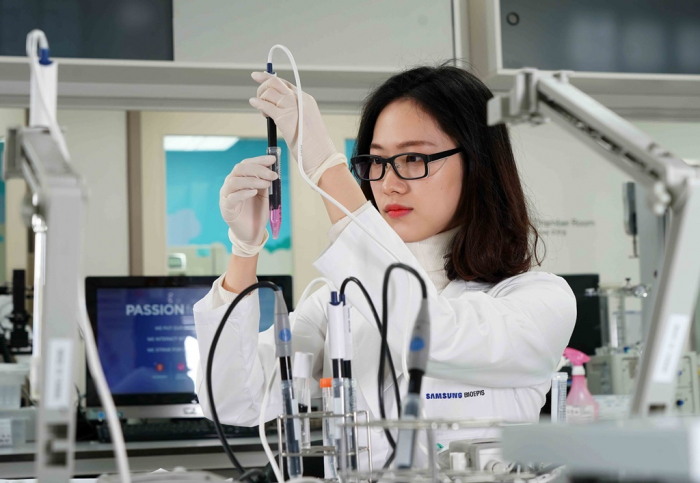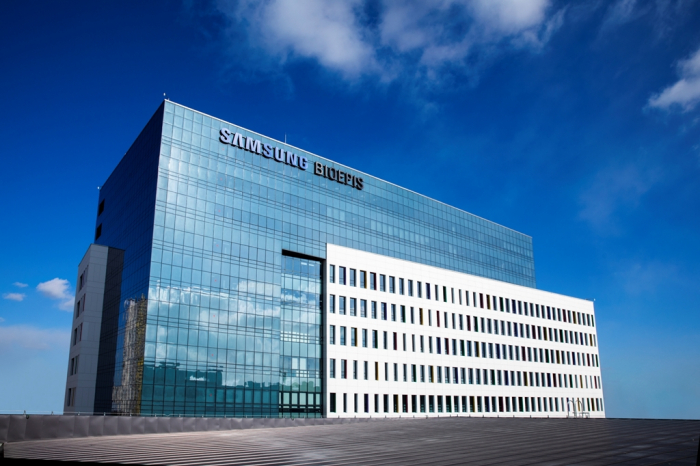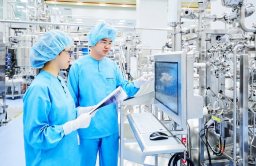-
KOSPI 2577.27 -2.21 -0.09%
-
KOSDAQ 722.52 -7.07 -0.97%
-
KOSPI200 341.49 +0.02 +0.01%
-
USD/KRW 1396 -2.00 0.14%
Samsung Bioepis’ SB12 shows same clinical effects as Alexion’s Soliris
Bio & Pharma
Samsung Bioepis’ SB12 shows same clinical effects as Alexion’s Soliris
Samsung will compete with Amgen for the sale of the rare blood disease biosimilar product
By
Jun 14, 2022 (Gmt+09:00)
1
Min read
News+

Samsung Bioepis Co., a biopharmaceutical unit of Samsung Group, said its SB12, a proposed biosimilar to Alexion Pharmaceuticals Inc.’s rare blood disease medicine, Soliris, has shown the same clinical effects.
While presenting the results of its phase 3 study of the biosimilar at the European Hematology Association (EHA), Samsung said SB12 (Eculizumab) has demonstrated clinical equivalence in efficacy, safety and immunogenicity compared to Alexion’s blockbuster treatment Soliris in 50 paroxysmal nocturnal hemoglobinuria (PNH) patients.
Soliris, the original Eculizumab drug, obtained the US Food and Drug Administration’s approval in 2007 and posted $1.87 billion in global sales in 2021.
Alexion, the developer of the drug, was taken over by AstraZeneca plc, a British-Swedish multinational pharmaceutical and biotechnology company, last year.
“With the completion of the phase 3 trial on SB12, we are preparing to obtain the FDA’s approval for the sale of the biosimilar product,” said a Samsung Bioepis official.
Amgen Inc., a US biopharmaceutical firm, also plans to unveil its biosimilar version of Soliris. The company is expected to complete the phase 3 test of its candidate ABP 959 next month.

TO DOUBLE BIOSIMILARS BY 2025
Earlier this year, Samsung Bioepis said it aims to double the number of its biosimilar products on sale to 10 by 2025 and accelerate its push for the development of novel therapeutics.
The company currently sells five biosimilars – three in the autoimmune sector, which are Infliximab, Etanercept, Adalimumab; and two others, Trastuzumab and Bevacizumab, in oncology.
The five products are sold via its two US-based global sales partners, Biogen Inc. and Organon & Co.
Samsung is set to add another product to its sales list – Byooviz, a biosimilar referencing Lucentis for the treatment of macular degeneration.
Three other Samsung biosimilars, which are replicas of Eylea, Stelara and Prolia, are expected to complete their phase 3 clinical trials by the end of this year.
Write to Jae-young Han at jyhan@hankyung.com
In-Soo Nam edited this article.
More To Read
-
 Mergers & AcquisitionsSamsung buys $2.3 bn Bioepis stake from Biogen to end partnership
Mergers & AcquisitionsSamsung buys $2.3 bn Bioepis stake from Biogen to end partnershipJan 28, 2022 (Gmt+09:00)


